Unit 1 Food for thought Using language课件(共47张,内嵌音频)外研版(2019)必修第二册(共48页)
文档属性
| 名称 | Unit 1 Food for thought Using language课件(共47张,内嵌音频)外研版(2019)必修第二册(共48页) | 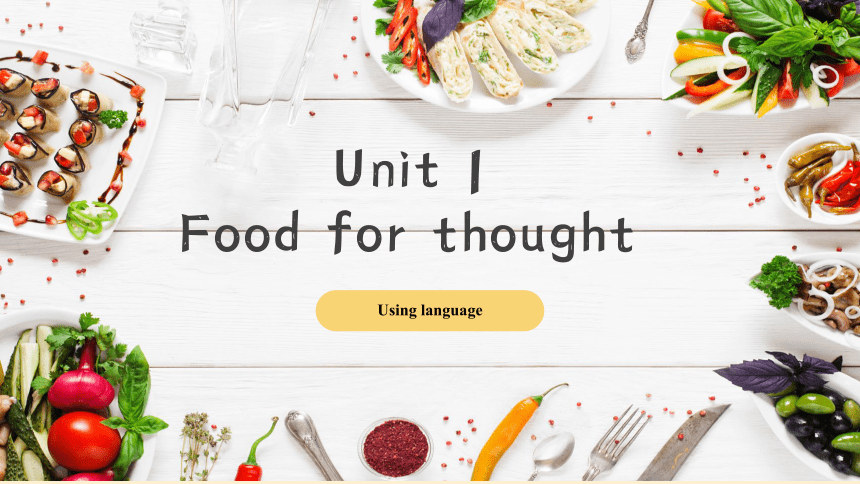 | |
| 格式 | pptx | ||
| 文件大小 | 52.4MB | ||
| 资源类型 | 教案 | ||
| 版本资源 | 外研版(2019) | ||
| 科目 | 英语 | ||
| 更新时间 | 2025-08-01 10:28:19 | ||
图片预览

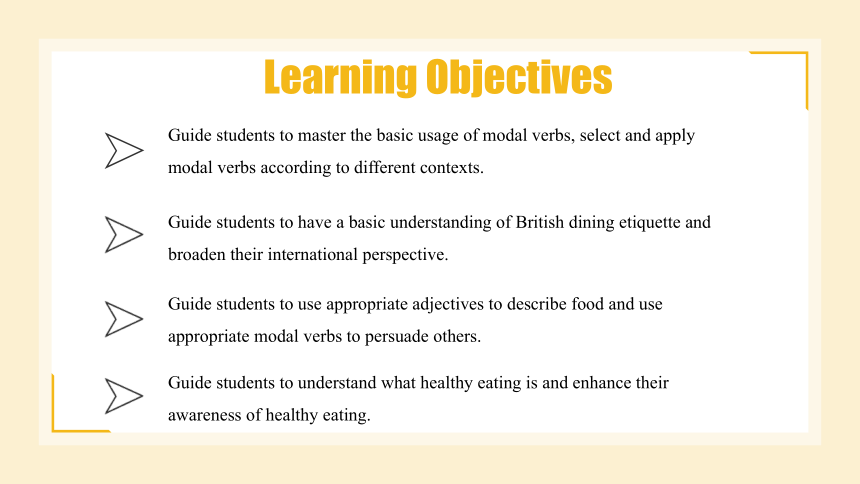
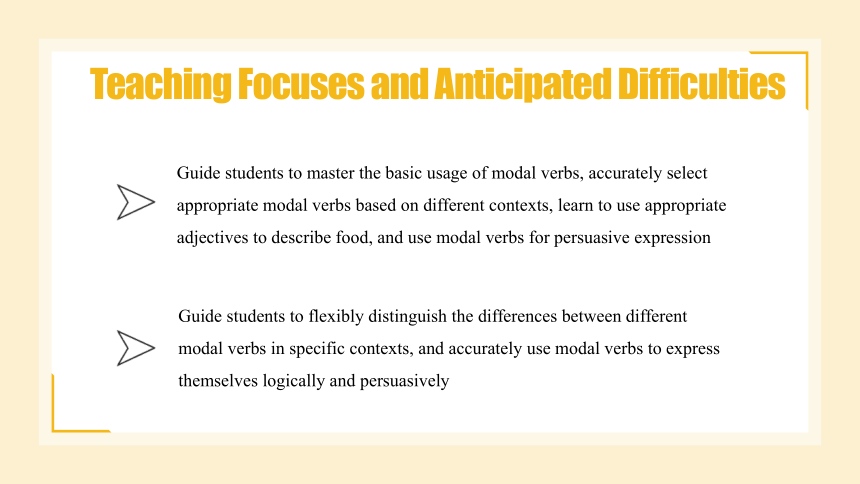
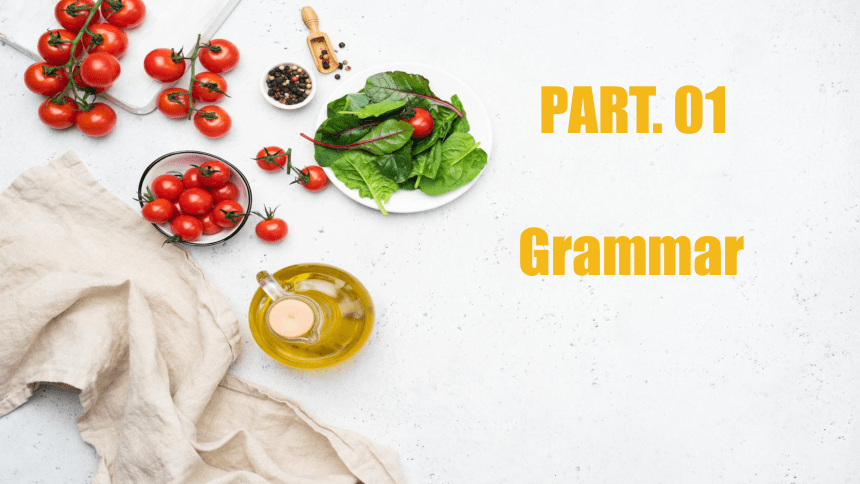
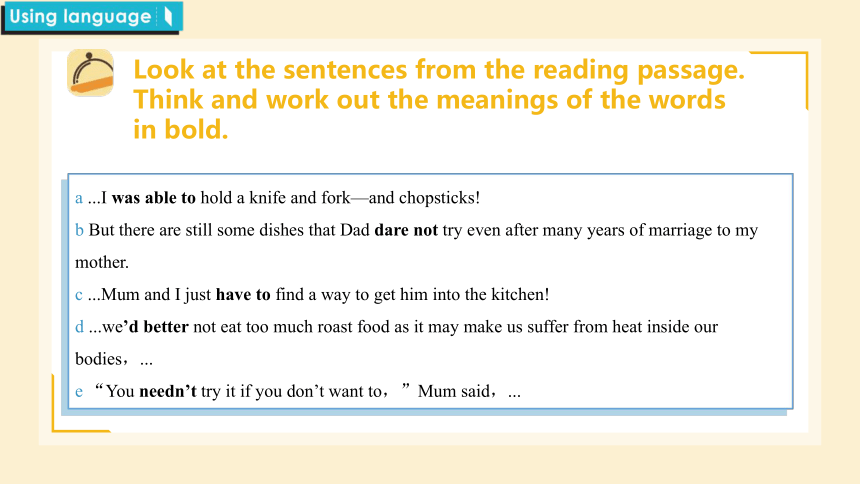
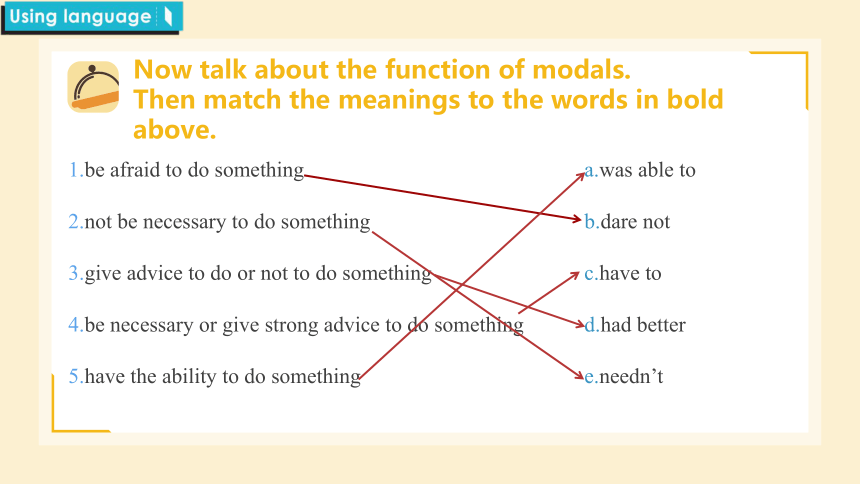
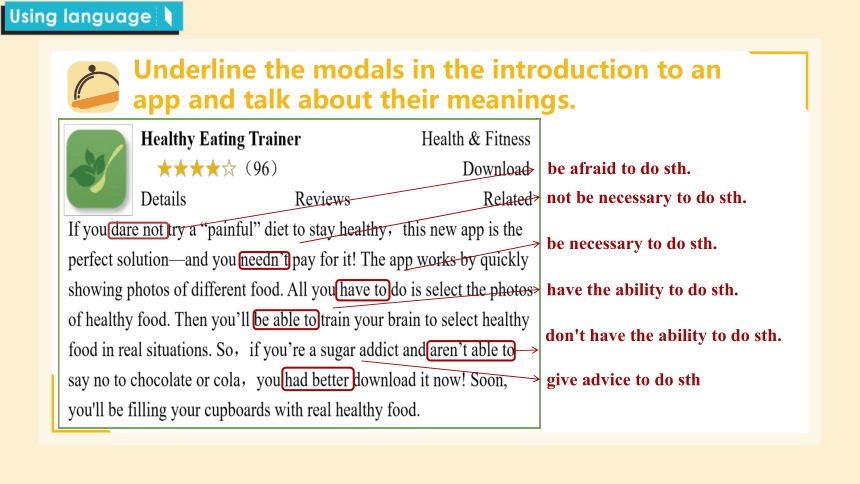
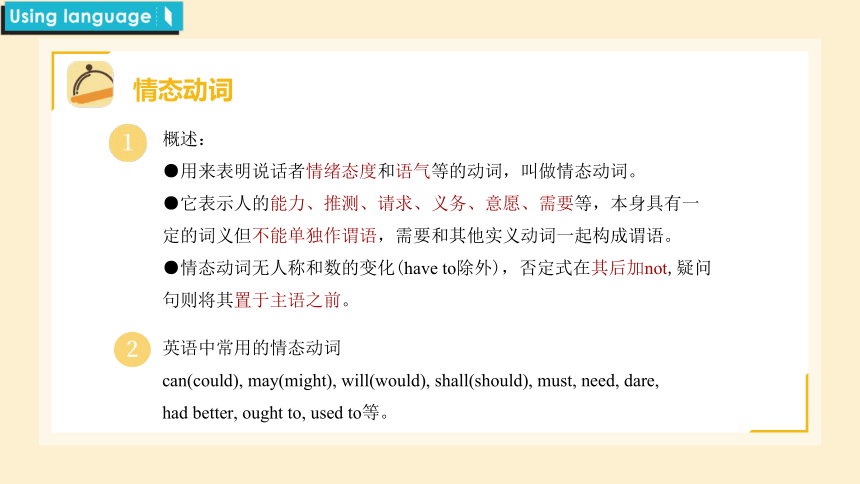
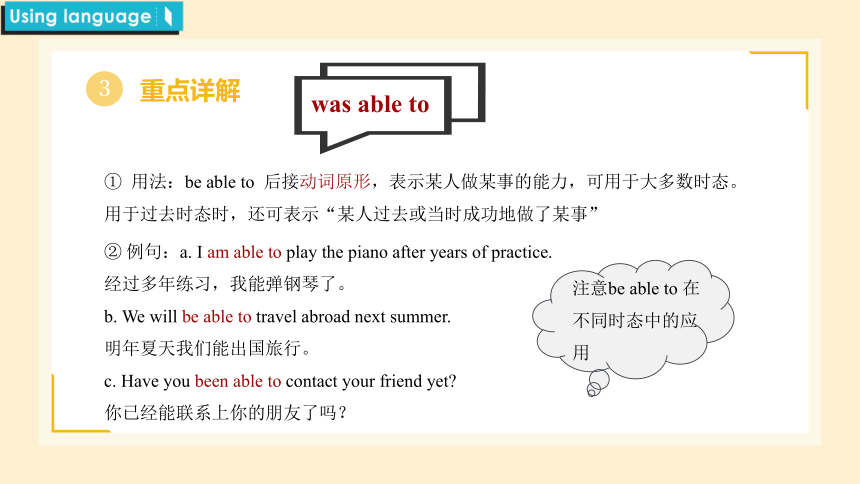
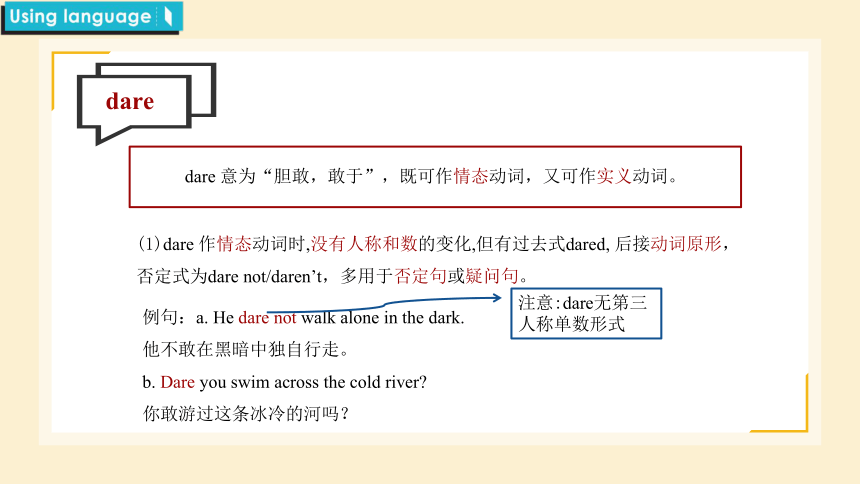
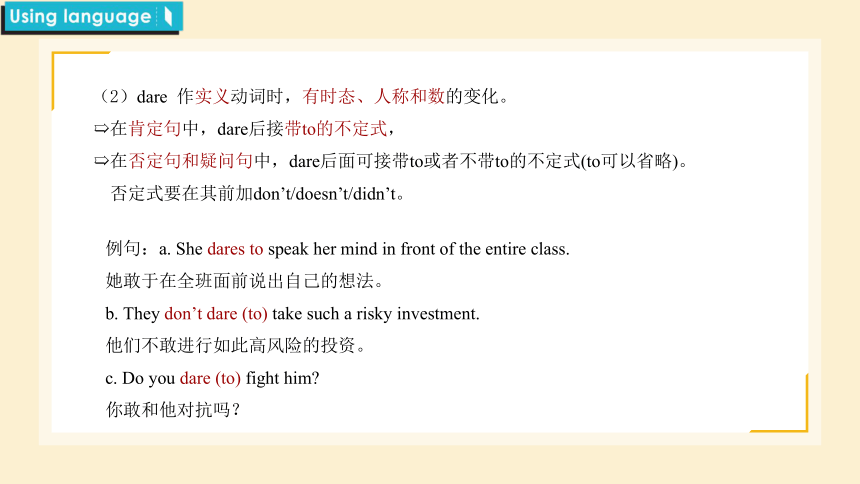
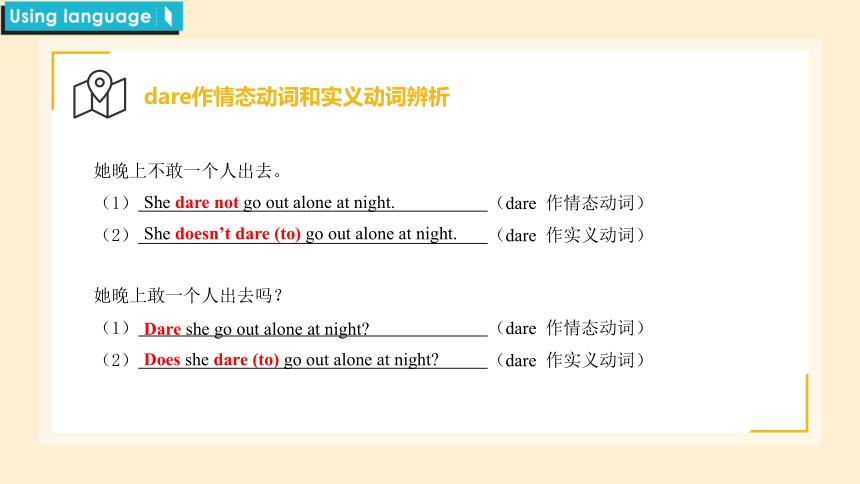
文档简介
(共47张PPT)
Using language
Unit 1
Food for thought
Learning Objectives
Guide students to master the basic usage of modal verbs, select and apply modal verbs according to different contexts.
Guide students to have a basic understanding of British dining etiquette and broaden their international perspective.
Guide students to use appropriate adjectives to describe food and use appropriate modal verbs to persuade others.
Guide students to understand what healthy eating is and enhance their awareness of healthy eating.
Teaching Focuses and Anticipated Difficulties
Guide students to master the basic usage of modal verbs, accurately select appropriate modal verbs based on different contexts, learn to use appropriate adjectives to describe food, and use modal verbs for persuasive expression
Guide students to flexibly distinguish the differences between different modal verbs in specific contexts, and accurately use modal verbs to express themselves logically and persuasively
PART. 01
Grammar
a ...I was able to hold a knife and fork—and chopsticks!
b But there are still some dishes that Dad dare not try even after many years of marriage to my mother.
c ...Mum and I just have to find a way to get him into the kitchen!
d ...we’d better not eat too much roast food as it may make us suffer from heat inside our bodies,...
e “You needn’t try it if you don’t want to,”Mum said,...
Look at the sentences from the reading passage. Think and work out the meanings of the words in bold.
1.be afraid to do something a.was able to
2.not be necessary to do something b.dare not
3.give advice to do or not to do something c.have to
4.be necessary or give strong advice to do something d.had better
5.have the ability to do something e.needn’t
Now talk about the function of modals.
Then match the meanings to the words in bold above.
be afraid to do sth.
not be necessary to do sth.
be necessary to do sth.
have the ability to do sth.
give advice to do sth
don't have the ability to do sth.
Underline the modals in the introduction to an app and talk about their meanings.
概述:
●用来表明说话者情绪态度和语气等的动词,叫做情态动词。
●它表示人的能力、推测、请求、义务、意愿、需要等,本身具有一定的词义但不能单独作谓语,需要和其他实义动词一起构成谓语。
●情态动词无人称和数的变化(have to除外),否定式在其后加not,疑问句则将其置于主语之前。
情态动词
2
英语中常用的情态动词
can(could), may(might), will(would), shall(should), must, need, dare, had better, ought to, used to等。
重点详解
① 用法:be able to 后接动词原形,表示某人做某事的能力,可用于大多数时态。 用于过去时态时,还可表示“某人过去或当时成功地做了某事”
② 例句:a. I am able to play the piano after years of practice.
经过多年练习,我能弹钢琴了。
b. We will be able to travel abroad next summer.
明年夏天我们能出国旅行。
c. Have you been able to contact your friend yet
你已经能联系上你的朋友了吗?
3
was able to
注意be able to 在不同时态中的应用
dare 意为“胆敢,敢于”,既可作情态动词,又可作实义动词。
(1)dare 作情态动词时,没有人称和数的变化,但有过去式dared, 后接动词原形,否定式为dare not/daren’t,多用于否定句或疑问句。
dare
例句:a. He dare not walk alone in the dark.
他不敢在黑暗中独自行走。
b. Dare you swim across the cold river
你敢游过这条冰冷的河吗?
注意:dare无第三人称单数形式
(2)dare 作实义动词时,有时态、人称和数的变化。
在肯定句中,dare后接带to的不定式,
在否定句和疑问句中,dare后面可接带to或者不带to的不定式(to可以省略)。
否定式要在其前加don’t/doesn’t/didn’t。
例句:a. She dares to speak her mind in front of the entire class.
她敢于在全班面前说出自己的想法。
b. They don’t dare (to) take such a risky investment.
他们不敢进行如此高风险的投资。
c. Do you dare (to) fight him
你敢和他对抗吗?
dare作情态动词和实义动词辨析
她晚上不敢一个人出去。
(1) (dare 作情态动词)
(2) (dare 作实义动词)
她晚上敢一个人出去吗?
(1) (dare 作情态动词)
(2) (dare 作实义动词)
She dare not go out alone at night.
She doesn’t dare (to) go out alone at night.
Dare she go out alone at night
Does she dare (to) go out alone at night
need
need 意为“需要,有必要”,既可作情态动词,又可作实义动词。
(1)need 作情态动词时,没有人称和数的变化,后接动词原形,常用于否定句或疑问句中,否定式为need not/needn’t,意为“不必”。
例句:a. You needn’t worry about the exam.
你不必担心考试
b. Need I remind you of the deadline again
需要我再提醒你一次截止日期吗?
和dare做情态动词的用法相似
用法拓展
needn’t have done 表示实际上做了本来不必做的事,意为“本来不必”。
例句:You needn’t have bought so much food—there’s plenty in the fridge.
你本不必买这么多食物,冰箱里还有很多。
以need开头的疑问句,肯定回答用must,否定回答可用needn’t。
例句: Q: Need I attend the meeting
我需要参加会议吗?
A: Yes, you must. 是的,你必须参加。
No,you needn’t. 不,你不必参加。
(2) need 作实义动词时,有人称和数的变化。
用于陈述句、否定句或疑问句中均可,否定式和疑问式要借助助动词do/does/did。
need的用法:后接名词、代词、带to的不定式、动名词。
①带to的不定式:sb need to do sth 人作主语, 表示 “需要做某事”。
例句:She needs to buy a new laptop for work.
她需要买台新笔记本电脑工作。
②动名词:sth need doing (相当于 sth need to be done),物做主语,表被动含义。
例句:The car needs washing.(= The car needs to be washed.)
车需要洗了。
have to
● have to 表示“必须,不得不”,强调客观条件或外界因素迫使某人做某事(对比“must” 的主观意愿)。
have和must对比
a. He has to take the bus to work every day.
他每天必须坐公交上班(客观情况使得)
b. I must learn another language.
我必须学另一种语言(说话人的意愿)
● have to 的否定形式 don’t/doesn’t/didn’t have to 表示 “没有必要做某事”,且实际未做(对比 “needn’t have done” 的“已做但多余”)。
don’t/doesn’t/didn’t have to 和 needn’t have done对比
a. Employees don’t have to work on public holidays.
员工不必在公共假期工作。
b. She needn’t have attended the meeting— it was canceled.
她本不必参会,会议已取消。
【用法辨析】have to 与 must have to must
强调_______需要 强调_______看法
有________时态形式 只有一种形式
否定形式表示________ don’t/doesn’t/didn’t have to 否定形式表示________
mustn’t
客观
主观
多种
不必
禁止
(例如have/has/had/will have)
had better
★had better 后加动词原形,意为“最好”,主要用来表示劝告或建议,用于一般现在时或一般将来时,适用于所有人称,没有任何词形变化。
★否定式为had better not,后加动词原形,表示“最好不要做某事”,疑问式是把had提前。
例句:a. You’d better check the map before driving.
开车前最好查地图。
b. He’d better not eat too much junk food.
他最好别吃太多垃圾食品
c. Had we better leave now
我们最好现在离开吗?
While going on your first trip to the UK is exciting, new and different customs can also be confusing. Table manners are no exception. But don’t worry — here are some tips:
You 1. _________wait until everyone else has been served before you start eating.
Sometimes there are so many knives and forks that you 2. __________ pick them up in case you get it wrong. The trick is to start with the ones on the outside.
When you finish your meal, you 3. ____________ place the knife and fork together on your plate with the handles at the four o’clock position.
Table manners, however, can differ in different situations. For example, you 4. ___________ use a knife and fork when eating a hamburger or pizza. Just remember: when in Rome, do as the Romans do, and you will 5. __________ enjoy the local cuisine!
have to
dare not
had better
needn’t
be able to
Complete the tips for good table manners with the correct form of the modals in Activity 1.
1 Backyard BBQ, Kansas City, US
★★★★☆
56 reviews
The most tender steak I've ever had! The barbecue gives it that famous smoky flavour, and it comes with a shiny sauce that's very, very spicy!
2 Bund 59, Shanghai, China
★★★★★
98 reviews
A bowl of soup with a large, round meatball! The meatball is cooked through, which looked slightly pink inside. Incredibly soft and juicy - it melts in the mouth!
c
a
Activity 4
Read and match the comments to the pictures.
3 Antonio's Pizzeria. London.UK
★★☆☆☆
86 reviews
Worst pizza ever! I ordered a large vegetarian pizza, but it was tiny! It was served cold and came with some sort of sticky sauce which tasted bitter and smelt really fishy! The waiter even spilled some beer on me!
4 Madame Laurent's Bakery, Paris, France
★★★★★
95 reviews
You've got to try the strawberry cheesecake. lt's smooth and creamy with fresh strawberries, which give it a lovely sweet and fruity taste. Highly recommended!
d
b
shiny;large;round;pink;tiny;fresh
可补充:
burnt;thick;bright; colourful
fishy
可补充:
stinky;fragrant;
pungent
smoky;spicy;bitter;
sweet;fruity
可补充:
sour;raw;tasty;
hot;salty
tender;soft;juicy;cold;
sticky;smooth;creamy
可补充:
crispy;greasy;hard;
chewy;rubbery
Underline the words that describe food in Activity 4 and put them into the table. Add any more you can think of.
A: What's your favourite food
B: My favourite food is...
A: How does it look / smell / taste /feel
B: It looks / smells / tastes / feels…
Work in pairs.
Talk about your favourite food using the words you have learnt.
Healthy eating
PART. 02
Listening
Listen to the conversation and tick the food and drinks ordered.
Food and drinks Janet wants to order Harriet’s views
salad with dressing a lot of sugar, 1__________
and unhealthy 2___________
fruit juice just a small 3_________ of real fruit in it
has as much sugar as 4_________
fat-free yoghurt a lot of sugar to improve the 5____________, which can be 6____________
fat
chemicals
amount
soft drinks
taste
harmful
Listen again and complete the note.
Formal Ones
1. I think it might be a good idea/can’t be a better idea to... 我认为……可能是个好主意。
2. Have you thought of... 你想到过……吗?
3. I think you should reconsider...
我认为你应该重新考虑……
4. I would advise you to... 我会建议你……
Informal Ones
1. I think you should... 我想你应该……
2. What about... ……怎么样?
3. I think it’s better than...
我认为它比……要好一些。
4. I’m not sure whether that’s the best decision.
我不能肯定那是不是最好的决定。
Some persuasive expressions for others:
Now talk about what Harriet says to persuade Janet.
Listen again if necessary.
student A
You are a salesperson. You want to persuade a customer to buy a new mixed fruit drink. You have the following information about the drink:
It’s a mixture of six different fruits and vegetables.
It’s rich in fibre and vitamins.
It’s good for our digestive system.
It’s 15 yuan per bottle.
Customers can get 20% off if they buy five bottles or more at a time.
Work in pairs.
Act out the conversation to persuade a customer to buy a new mixed fruit drink.
student B
You are a customer. Student A is selling a new mixed fruit drink, but you want to make sure that it’s healthy. Ask Student A for the following information about the drink and decide if you want to buy it.
ingredients
taste
benefits from drinking it
price
Learning to learn
When giving advice, it’s usual to give your opinion within your first sentence. This makes the listener more interested in what you are saying.
Here are some examples: Not a good idea. Did you know that… Sorry, but there’s a problem with...
Work in pairs.
Think of a similar situation and have a conversation.
PART. 03
Language points
Vocabulary
function
perform/fulfill a...function 履行……职责,发挥……作用
perform a variety of functions 履行多种职责
the function of the heart 心脏的功能
the function of a policeman 警察的职能
perform a vital function 起重要作用
function as 起……作用;充当
function well (properly )/normally/efficiently 运转良好/正常 /高效
练习:We have developed a new type of software with several new __________ (function).
functions
2. related
be related to 与……有关系/有关联
(be)closely/strongly related to 与……有密切关系
(be)directly related to 与……有直接关系
be related to other products 关联其他产品
be related to these other members of the family 与其他家庭成员相关联
a related issue/question 相关的课题/问题
a stress-related illness 压力导致的疾病
练习:She suffers from memory loss __________ (relate) to her disease.
related
3. diet
keep/have a healthy and balanced diet 保持健康、平衡的膳食
a low-fat, salt-free diet 低脂无盐饮食
be on a diet 在节食(表状态)
go on a diet 开始节食(表动作 )
put sb. on a diet 限制某人的饮食
stick to a diet 坚持某一种饮食
follow a diet 按照规定饮食
练习:She has been ______ a diet for two weeks
and has lost five pounds as a result.
on
4. tip
a useful tip 有用的建议
a simple tip 简单的窍门
take one's tip 听从某人的提示
the tip of her nose 她的鼻尖
on the tip of one's tongue 话到嘴边
give/offer a tip 付小费,给小费
leave a tip 留小费
receive/accept a tip 收小费
练习:No one knows why her sleeves cover her hands to the _______ of her fingers.
tips
5. custom
customs and habits 风俗习惯
an old/ancient custom 旧的/古老的习俗
a local custom 当地的风俗习惯
It's the custom (for sb.) to do sth. (对某人来说)做某事是一种习俗。
练习:The celebration of the Spring Festival in China is ____ custom.
a
6. manner
table manners 餐桌礼仪
have good/bad manners 有/没有礼貌
have no manners 没有礼貌
mind one's manner 注意自己的举止
It is bad manners to do sth. 做某事是不礼貌的。
in a...manner 以……方式(方法)
in a friendly manner 用友好的方式
in a rude manner =rude in manner 粗鲁地
练习:Small talk is the basis of good __________ (manner).
manners
7. trick
a trick of doing sth./to do sth. 做某事的诀窍/计谋
play a trick/tricks on 捉弄,戏耍,搞恶作剧,开……的玩笑
perform/do a trick 变戏法
do the trick 奏效,起作用,达到目的
trick sb. into doing sth. 诱使/骗得某人做某事
trick sb. out of sth. 骗取某人某物
trick or treat 不送礼物就捣乱
练习:Magic shows are entertaining as long as the audience
does not discover how the __________ (trick) are done.
tricks
8. handle
handle sth. well/perfectly/badly/poorly 某事处理得好/完美/不好/很差
handle a problem 处理问题
handle difficult customers 应付难对付的顾客
handle the crisis 处理危机
handle her patients 对待她的病人
handle stress 调节压力
handle this matter very badly 这件事处理得很糟糕
handle yourself 把握自己
练习:We got into trouble because none of us knew how __________
(handle) the machine.
to handle
9. recommend
recommend sb. sth. = recommend sth. to sb. 向某人推荐某物
recommend sth. for 推荐某物作……(某种用途)
recommend sb. for... 推荐某人做……(某岗位)
recommend sb.as... 推荐某人作为……(某职务)
recommend doing sth. 建议做某事
recommend sb.to do sth. 建议某人做某事
recommend that sb.(should) do sth 建议某人做某事(从句用虚拟语气)
It's (strongly) recommended that... (should) do sth 有人(强烈)建议……
练习:She (recommend) that we go to the art exhibition this weekend.
recommends
10. attack
attack the enemy 攻击敌人
be/get attacked 受到攻击;被袭击
attack sb. with sth. 用某物袭击某人
attack sb. for (doing) sth. 因(做)某事而抨击某人
make an attack on 发起对……的袭击/抨击
under attack 受到攻击
have/suffer a heart attack 心脏病发作
练习:Even plants can run a fever, especially when they're
________ attack by insects or diseases.
under
11. within
within (easy)reach (of...) 很接近……,靠近……
within one's power 在某人能力范围内
within sight (of) 可以看见……;……在视线内
within the limit of... 在……限度内
within limits 在某种程度上,有一定限制
within walking distance 在步行距离之内
练习:The beach is ________ walking distance from my house and we can hear the sound of the sea.
within
1.The _________ (function) of this machine is to cut the materials into pieces accurately.
2.________ (relate) to the latest scientific research, the book has received a lot of attention from experts.
3.He doesn't know how _____ __ (handle) this difficult situation.
4.The city has suffered several terrorist ______ (attack) in the past few years.
5.You should finish the task ______ two hours.
Exercise
function
Related
to handle
attacks
within
1.Review the modal verbs and key vocabulary of this lesson
2.Write a suggestion letter to your desk mate
Homework
Thanks
Using language
Unit 1
Food for thought
Learning Objectives
Guide students to master the basic usage of modal verbs, select and apply modal verbs according to different contexts.
Guide students to have a basic understanding of British dining etiquette and broaden their international perspective.
Guide students to use appropriate adjectives to describe food and use appropriate modal verbs to persuade others.
Guide students to understand what healthy eating is and enhance their awareness of healthy eating.
Teaching Focuses and Anticipated Difficulties
Guide students to master the basic usage of modal verbs, accurately select appropriate modal verbs based on different contexts, learn to use appropriate adjectives to describe food, and use modal verbs for persuasive expression
Guide students to flexibly distinguish the differences between different modal verbs in specific contexts, and accurately use modal verbs to express themselves logically and persuasively
PART. 01
Grammar
a ...I was able to hold a knife and fork—and chopsticks!
b But there are still some dishes that Dad dare not try even after many years of marriage to my mother.
c ...Mum and I just have to find a way to get him into the kitchen!
d ...we’d better not eat too much roast food as it may make us suffer from heat inside our bodies,...
e “You needn’t try it if you don’t want to,”Mum said,...
Look at the sentences from the reading passage. Think and work out the meanings of the words in bold.
1.be afraid to do something a.was able to
2.not be necessary to do something b.dare not
3.give advice to do or not to do something c.have to
4.be necessary or give strong advice to do something d.had better
5.have the ability to do something e.needn’t
Now talk about the function of modals.
Then match the meanings to the words in bold above.
be afraid to do sth.
not be necessary to do sth.
be necessary to do sth.
have the ability to do sth.
give advice to do sth
don't have the ability to do sth.
Underline the modals in the introduction to an app and talk about their meanings.
概述:
●用来表明说话者情绪态度和语气等的动词,叫做情态动词。
●它表示人的能力、推测、请求、义务、意愿、需要等,本身具有一定的词义但不能单独作谓语,需要和其他实义动词一起构成谓语。
●情态动词无人称和数的变化(have to除外),否定式在其后加not,疑问句则将其置于主语之前。
情态动词
2
英语中常用的情态动词
can(could), may(might), will(would), shall(should), must, need, dare, had better, ought to, used to等。
重点详解
① 用法:be able to 后接动词原形,表示某人做某事的能力,可用于大多数时态。 用于过去时态时,还可表示“某人过去或当时成功地做了某事”
② 例句:a. I am able to play the piano after years of practice.
经过多年练习,我能弹钢琴了。
b. We will be able to travel abroad next summer.
明年夏天我们能出国旅行。
c. Have you been able to contact your friend yet
你已经能联系上你的朋友了吗?
3
was able to
注意be able to 在不同时态中的应用
dare 意为“胆敢,敢于”,既可作情态动词,又可作实义动词。
(1)dare 作情态动词时,没有人称和数的变化,但有过去式dared, 后接动词原形,否定式为dare not/daren’t,多用于否定句或疑问句。
dare
例句:a. He dare not walk alone in the dark.
他不敢在黑暗中独自行走。
b. Dare you swim across the cold river
你敢游过这条冰冷的河吗?
注意:dare无第三人称单数形式
(2)dare 作实义动词时,有时态、人称和数的变化。
在肯定句中,dare后接带to的不定式,
在否定句和疑问句中,dare后面可接带to或者不带to的不定式(to可以省略)。
否定式要在其前加don’t/doesn’t/didn’t。
例句:a. She dares to speak her mind in front of the entire class.
她敢于在全班面前说出自己的想法。
b. They don’t dare (to) take such a risky investment.
他们不敢进行如此高风险的投资。
c. Do you dare (to) fight him
你敢和他对抗吗?
dare作情态动词和实义动词辨析
她晚上不敢一个人出去。
(1) (dare 作情态动词)
(2) (dare 作实义动词)
她晚上敢一个人出去吗?
(1) (dare 作情态动词)
(2) (dare 作实义动词)
She dare not go out alone at night.
She doesn’t dare (to) go out alone at night.
Dare she go out alone at night
Does she dare (to) go out alone at night
need
need 意为“需要,有必要”,既可作情态动词,又可作实义动词。
(1)need 作情态动词时,没有人称和数的变化,后接动词原形,常用于否定句或疑问句中,否定式为need not/needn’t,意为“不必”。
例句:a. You needn’t worry about the exam.
你不必担心考试
b. Need I remind you of the deadline again
需要我再提醒你一次截止日期吗?
和dare做情态动词的用法相似
用法拓展
needn’t have done 表示实际上做了本来不必做的事,意为“本来不必”。
例句:You needn’t have bought so much food—there’s plenty in the fridge.
你本不必买这么多食物,冰箱里还有很多。
以need开头的疑问句,肯定回答用must,否定回答可用needn’t。
例句: Q: Need I attend the meeting
我需要参加会议吗?
A: Yes, you must. 是的,你必须参加。
No,you needn’t. 不,你不必参加。
(2) need 作实义动词时,有人称和数的变化。
用于陈述句、否定句或疑问句中均可,否定式和疑问式要借助助动词do/does/did。
need的用法:后接名词、代词、带to的不定式、动名词。
①带to的不定式:sb need to do sth 人作主语, 表示 “需要做某事”。
例句:She needs to buy a new laptop for work.
她需要买台新笔记本电脑工作。
②动名词:sth need doing (相当于 sth need to be done),物做主语,表被动含义。
例句:The car needs washing.(= The car needs to be washed.)
车需要洗了。
have to
● have to 表示“必须,不得不”,强调客观条件或外界因素迫使某人做某事(对比“must” 的主观意愿)。
have和must对比
a. He has to take the bus to work every day.
他每天必须坐公交上班(客观情况使得)
b. I must learn another language.
我必须学另一种语言(说话人的意愿)
● have to 的否定形式 don’t/doesn’t/didn’t have to 表示 “没有必要做某事”,且实际未做(对比 “needn’t have done” 的“已做但多余”)。
don’t/doesn’t/didn’t have to 和 needn’t have done对比
a. Employees don’t have to work on public holidays.
员工不必在公共假期工作。
b. She needn’t have attended the meeting— it was canceled.
她本不必参会,会议已取消。
【用法辨析】have to 与 must have to must
强调_______需要 强调_______看法
有________时态形式 只有一种形式
否定形式表示________ don’t/doesn’t/didn’t have to 否定形式表示________
mustn’t
客观
主观
多种
不必
禁止
(例如have/has/had/will have)
had better
★had better 后加动词原形,意为“最好”,主要用来表示劝告或建议,用于一般现在时或一般将来时,适用于所有人称,没有任何词形变化。
★否定式为had better not,后加动词原形,表示“最好不要做某事”,疑问式是把had提前。
例句:a. You’d better check the map before driving.
开车前最好查地图。
b. He’d better not eat too much junk food.
他最好别吃太多垃圾食品
c. Had we better leave now
我们最好现在离开吗?
While going on your first trip to the UK is exciting, new and different customs can also be confusing. Table manners are no exception. But don’t worry — here are some tips:
You 1. _________wait until everyone else has been served before you start eating.
Sometimes there are so many knives and forks that you 2. __________ pick them up in case you get it wrong. The trick is to start with the ones on the outside.
When you finish your meal, you 3. ____________ place the knife and fork together on your plate with the handles at the four o’clock position.
Table manners, however, can differ in different situations. For example, you 4. ___________ use a knife and fork when eating a hamburger or pizza. Just remember: when in Rome, do as the Romans do, and you will 5. __________ enjoy the local cuisine!
have to
dare not
had better
needn’t
be able to
Complete the tips for good table manners with the correct form of the modals in Activity 1.
1 Backyard BBQ, Kansas City, US
★★★★☆
56 reviews
The most tender steak I've ever had! The barbecue gives it that famous smoky flavour, and it comes with a shiny sauce that's very, very spicy!
2 Bund 59, Shanghai, China
★★★★★
98 reviews
A bowl of soup with a large, round meatball! The meatball is cooked through, which looked slightly pink inside. Incredibly soft and juicy - it melts in the mouth!
c
a
Activity 4
Read and match the comments to the pictures.
3 Antonio's Pizzeria. London.UK
★★☆☆☆
86 reviews
Worst pizza ever! I ordered a large vegetarian pizza, but it was tiny! It was served cold and came with some sort of sticky sauce which tasted bitter and smelt really fishy! The waiter even spilled some beer on me!
4 Madame Laurent's Bakery, Paris, France
★★★★★
95 reviews
You've got to try the strawberry cheesecake. lt's smooth and creamy with fresh strawberries, which give it a lovely sweet and fruity taste. Highly recommended!
d
b
shiny;large;round;pink;tiny;fresh
可补充:
burnt;thick;bright; colourful
fishy
可补充:
stinky;fragrant;
pungent
smoky;spicy;bitter;
sweet;fruity
可补充:
sour;raw;tasty;
hot;salty
tender;soft;juicy;cold;
sticky;smooth;creamy
可补充:
crispy;greasy;hard;
chewy;rubbery
Underline the words that describe food in Activity 4 and put them into the table. Add any more you can think of.
A: What's your favourite food
B: My favourite food is...
A: How does it look / smell / taste /feel
B: It looks / smells / tastes / feels…
Work in pairs.
Talk about your favourite food using the words you have learnt.
Healthy eating
PART. 02
Listening
Listen to the conversation and tick the food and drinks ordered.
Food and drinks Janet wants to order Harriet’s views
salad with dressing a lot of sugar, 1__________
and unhealthy 2___________
fruit juice just a small 3_________ of real fruit in it
has as much sugar as 4_________
fat-free yoghurt a lot of sugar to improve the 5____________, which can be 6____________
fat
chemicals
amount
soft drinks
taste
harmful
Listen again and complete the note.
Formal Ones
1. I think it might be a good idea/can’t be a better idea to... 我认为……可能是个好主意。
2. Have you thought of... 你想到过……吗?
3. I think you should reconsider...
我认为你应该重新考虑……
4. I would advise you to... 我会建议你……
Informal Ones
1. I think you should... 我想你应该……
2. What about... ……怎么样?
3. I think it’s better than...
我认为它比……要好一些。
4. I’m not sure whether that’s the best decision.
我不能肯定那是不是最好的决定。
Some persuasive expressions for others:
Now talk about what Harriet says to persuade Janet.
Listen again if necessary.
student A
You are a salesperson. You want to persuade a customer to buy a new mixed fruit drink. You have the following information about the drink:
It’s a mixture of six different fruits and vegetables.
It’s rich in fibre and vitamins.
It’s good for our digestive system.
It’s 15 yuan per bottle.
Customers can get 20% off if they buy five bottles or more at a time.
Work in pairs.
Act out the conversation to persuade a customer to buy a new mixed fruit drink.
student B
You are a customer. Student A is selling a new mixed fruit drink, but you want to make sure that it’s healthy. Ask Student A for the following information about the drink and decide if you want to buy it.
ingredients
taste
benefits from drinking it
price
Learning to learn
When giving advice, it’s usual to give your opinion within your first sentence. This makes the listener more interested in what you are saying.
Here are some examples: Not a good idea. Did you know that… Sorry, but there’s a problem with...
Work in pairs.
Think of a similar situation and have a conversation.
PART. 03
Language points
Vocabulary
function
perform/fulfill a...function 履行……职责,发挥……作用
perform a variety of functions 履行多种职责
the function of the heart 心脏的功能
the function of a policeman 警察的职能
perform a vital function 起重要作用
function as 起……作用;充当
function well (properly )/normally/efficiently 运转良好/正常 /高效
练习:We have developed a new type of software with several new __________ (function).
functions
2. related
be related to 与……有关系/有关联
(be)closely/strongly related to 与……有密切关系
(be)directly related to 与……有直接关系
be related to other products 关联其他产品
be related to these other members of the family 与其他家庭成员相关联
a related issue/question 相关的课题/问题
a stress-related illness 压力导致的疾病
练习:She suffers from memory loss __________ (relate) to her disease.
related
3. diet
keep/have a healthy and balanced diet 保持健康、平衡的膳食
a low-fat, salt-free diet 低脂无盐饮食
be on a diet 在节食(表状态)
go on a diet 开始节食(表动作 )
put sb. on a diet 限制某人的饮食
stick to a diet 坚持某一种饮食
follow a diet 按照规定饮食
练习:She has been ______ a diet for two weeks
and has lost five pounds as a result.
on
4. tip
a useful tip 有用的建议
a simple tip 简单的窍门
take one's tip 听从某人的提示
the tip of her nose 她的鼻尖
on the tip of one's tongue 话到嘴边
give/offer a tip 付小费,给小费
leave a tip 留小费
receive/accept a tip 收小费
练习:No one knows why her sleeves cover her hands to the _______ of her fingers.
tips
5. custom
customs and habits 风俗习惯
an old/ancient custom 旧的/古老的习俗
a local custom 当地的风俗习惯
It's the custom (for sb.) to do sth. (对某人来说)做某事是一种习俗。
练习:The celebration of the Spring Festival in China is ____ custom.
a
6. manner
table manners 餐桌礼仪
have good/bad manners 有/没有礼貌
have no manners 没有礼貌
mind one's manner 注意自己的举止
It is bad manners to do sth. 做某事是不礼貌的。
in a...manner 以……方式(方法)
in a friendly manner 用友好的方式
in a rude manner =rude in manner 粗鲁地
练习:Small talk is the basis of good __________ (manner).
manners
7. trick
a trick of doing sth./to do sth. 做某事的诀窍/计谋
play a trick/tricks on 捉弄,戏耍,搞恶作剧,开……的玩笑
perform/do a trick 变戏法
do the trick 奏效,起作用,达到目的
trick sb. into doing sth. 诱使/骗得某人做某事
trick sb. out of sth. 骗取某人某物
trick or treat 不送礼物就捣乱
练习:Magic shows are entertaining as long as the audience
does not discover how the __________ (trick) are done.
tricks
8. handle
handle sth. well/perfectly/badly/poorly 某事处理得好/完美/不好/很差
handle a problem 处理问题
handle difficult customers 应付难对付的顾客
handle the crisis 处理危机
handle her patients 对待她的病人
handle stress 调节压力
handle this matter very badly 这件事处理得很糟糕
handle yourself 把握自己
练习:We got into trouble because none of us knew how __________
(handle) the machine.
to handle
9. recommend
recommend sb. sth. = recommend sth. to sb. 向某人推荐某物
recommend sth. for 推荐某物作……(某种用途)
recommend sb. for... 推荐某人做……(某岗位)
recommend sb.as... 推荐某人作为……(某职务)
recommend doing sth. 建议做某事
recommend sb.to do sth. 建议某人做某事
recommend that sb.(should) do sth 建议某人做某事(从句用虚拟语气)
It's (strongly) recommended that... (should) do sth 有人(强烈)建议……
练习:She (recommend) that we go to the art exhibition this weekend.
recommends
10. attack
attack the enemy 攻击敌人
be/get attacked 受到攻击;被袭击
attack sb. with sth. 用某物袭击某人
attack sb. for (doing) sth. 因(做)某事而抨击某人
make an attack on 发起对……的袭击/抨击
under attack 受到攻击
have/suffer a heart attack 心脏病发作
练习:Even plants can run a fever, especially when they're
________ attack by insects or diseases.
under
11. within
within (easy)reach (of...) 很接近……,靠近……
within one's power 在某人能力范围内
within sight (of) 可以看见……;……在视线内
within the limit of... 在……限度内
within limits 在某种程度上,有一定限制
within walking distance 在步行距离之内
练习:The beach is ________ walking distance from my house and we can hear the sound of the sea.
within
1.The _________ (function) of this machine is to cut the materials into pieces accurately.
2.________ (relate) to the latest scientific research, the book has received a lot of attention from experts.
3.He doesn't know how _____ __ (handle) this difficult situation.
4.The city has suffered several terrorist ______ (attack) in the past few years.
5.You should finish the task ______ two hours.
Exercise
function
Related
to handle
attacks
within
1.Review the modal verbs and key vocabulary of this lesson
2.Write a suggestion letter to your desk mate
Homework
Thanks
